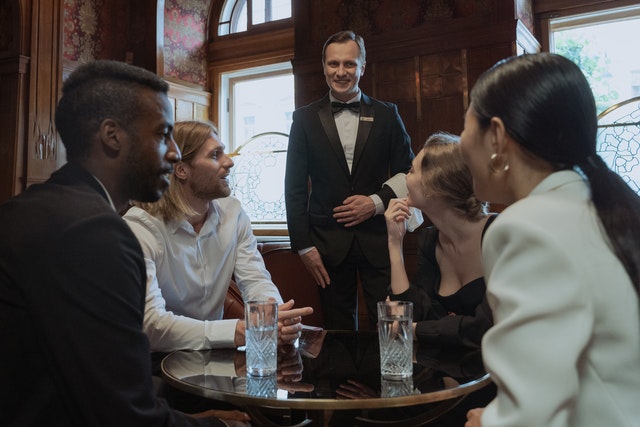Written by: Olivera Tolimir
In our previous blog posts, we talked a lot about Serbian grammar and its importance for learning how to speak Serbian properly. But sometimes teachers focus so much on grammar rules that students are left knowing all the conjugations, but with no knowledge of how to make small talk.
To avoid that same mistake, we prepared a list of 13 essential phrases in Serbian that will help you with your first attempts to speak Serbian.
We’ll start from the phrases for introducing yourself and teach you how to introduce yourself, say thank you, pay for a drink, and much more!
Meeting new people
Ja sam… / Zovem se… / Moje ime je…
If you want to speak Serbian with natives, first you need to introduce yourself! Since we’ve already written about the Serbian greetings, and you already know when to use ćao, and when dobar dan, we’ll skip that part and go straight to saying your name.
There are three ways to introduce yourself in Serbian. Luckily, the shortest one is the most common. Ja sam… means I am… So, if I wanted to introduce myself to you, I could say: Zdravo! Ja sam Olivera.
Two other ways to introduce yourself in Serbian are Zovem se (your name) and Moje ime je (your name). The first one’s literal translation is I’m called… and the other one’s My name is… These two phrases are a bit more formal than the first one.
Kako se (ti) zoveš? / Kako se (Vi) zovete?
This phrase means What’s your name.
As you can see, there are two versions of this question. This is the case because we have an informal and a formal way of speaking in our language. The informal way of speaking is used with friends, family, and peers in general, while we use the formal way when speaking to older people, or with our professors and bosses.

Drago mi je!
This phrase means Nice to meet you, so you should use it when meeting someone new.
We’ve learned how to introduce ourselves, ask another person for their name, and say: Nice to meet you. This means we’re able to communicate appropriately when meeting someone new! Let’s write some dialogues!
First, we’ll imagine our friend is introducing us to their friend. We would choose the informal way of communication here:
A: Ćao, ja sam Ana. Kako se ti zoveš?
B: Ćao! Ja sam Bojana.
A: Drago mi je!
B: I meni! (I meni means me, too).
Now let’s see what the dialogue would look like if we were meeting our new boss:
A: Dobar dan, moje ime je Ana.
B: Dobar dan. Ja sam Bojana.
A: Drago mi je!
B: Takođe. (Takođe = i meni)
Hvala (lepo / puno)!
Hvala means thank you. It’s short and easy to remember. If you want to be extra polite, you can add some of the adverbs, such as lepo or puno. It means: Thank you very much. If natives see you’ve just started to speak Serbian, but already know how to be polite, they’ll be delighted!
Nema na čemu! / Molim! / Ma ništa!
We use these phrases when someone thanks us. The first two can be translated as: You’re welcome and are both formal and informal, while the third one means: Oh, it’s nothing, and it’s better to use it with people close to you.
Odakle si? / Odakle ste?
Again, we have both formal and informal ways to ask someone where they’re from.
The answer should consist of the preposition iz (sometimes sa) and a country/town/city in the genitive. (Genitive is a second grammatical case in Serbian).
For example, the name of my country (in Serbian) is Srbija, so if someone asks me: Odakle si?, I say Iz Srbije.

Ne razumem (srpski).
This phrase is very useful if someone doesn’t realize you don’t speak Serbian yet! It means I don’t understand (Serbian).
Čime se baviš?
We ask this question when we want to know someone’s profession. The answer is pretty easy to compose: we start with I am… and then say the name of our profession.
For example, if someone asked me Čime se baviš, I would say Ja sam profesorica (I’m a (female) professor). The names of many professions in Serbian have both masculine and feminine forms (like actor and actress in English).

Čime se baviš u slobodno vreme?
As you can see, we only added the words u slobodno vreme to the previous phrase. These three words mean in your free time. So, now we’re interested in our acquaintance’s hobbies.
For example, if you like to paint, your answer would be U slobodno vreme slikam (slikam = I paint).
In a store or a restaurant
Izvolite! / Kako mogu da Vam pomognem?
When you enter a store, you’ll probably hear one of these phrases from a sales clerk. It means How can I help you?
If you don’t plan to buy anything or don’t need assistance at the moment, you can say Samo gledam (I’m just looking around). If you need help, you can ask Da li imate…? (Do you have…?). For example, if you want to try on a particular pair of shoes size 38, you can ask Da li imate ove cipele, broj 38? (Ove cipele = these shoes).
If you’re in a restaurant, a waiter will use the first phrase (Izvolite!), and then you’re supposed to tell him what you’d like to order. Going to stores and restaurants is a great way to start to speak Serbian with more certainty because you’ll be able to learn many new words!

(Da li želite) još nešto?
You’ll often hear this question at the cash register in a supermarket. It means (Would you like) anything else?
If you don’t want anything else, you should say: Ništa, hvala (Nothing else, thank you), but if you’d like that pack of gums at the counter, you can confirm by just saying Da, i ovo (Yes, this as well) and showing what you’d like to buy.
Molim Vas, račun! / Mogu li da platim?
We use these sentences when we want to pay for a meal or a drink in a restaurant. The first one means Check, please, and the second is a question meaning Can I pay?
Keš ili kartica?
After you ask for a bill, the waiter will always ask this question, because he wants to know whether you’re paying with cash or a card.
Cashiers also often ask this question.

We hope this list will help you manage your first conversations in Serbia and speak Serbian with confidence! What phrases do you find most useful?



